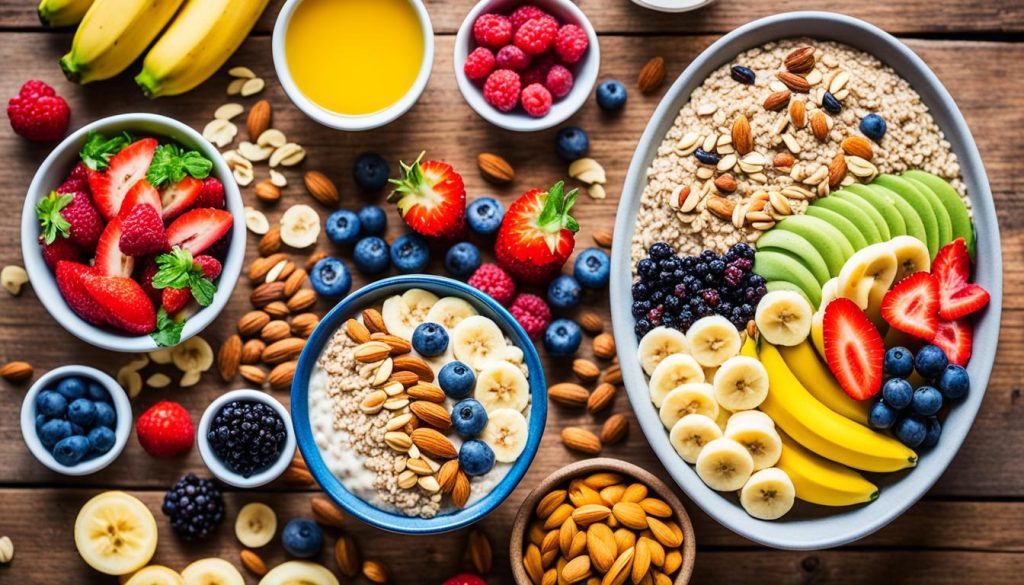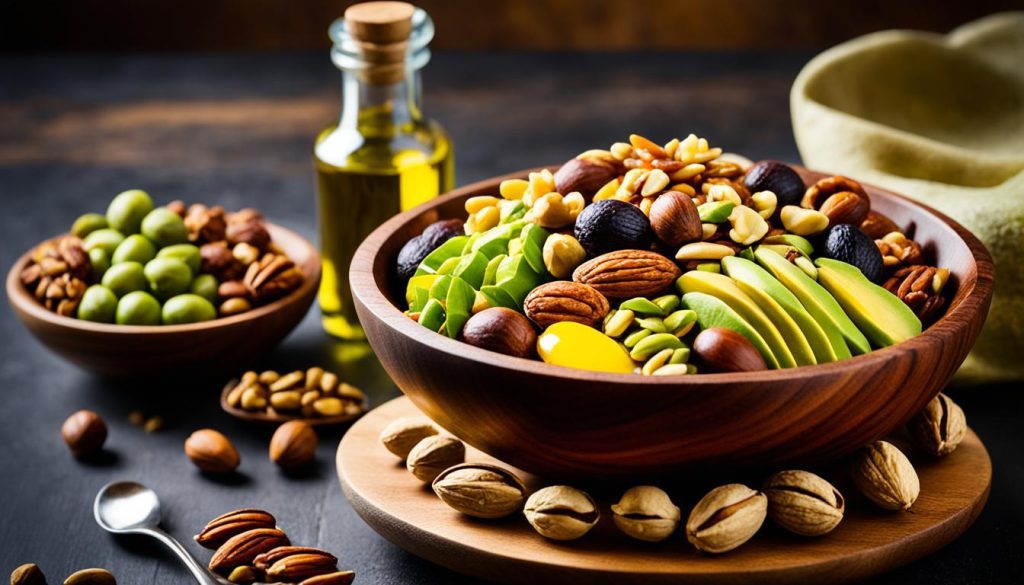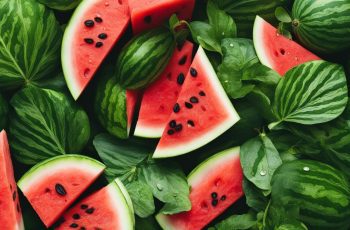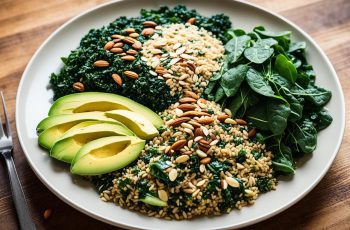Eating a heart-healthy diet is crucial for managing cholesterol levels and reducing the risk of heart disease. By incorporating specific foods into your daily meals, you can make a positive impact on your cholesterol levels and support overall heart health. Let’s explore the top cholesterol lowering foods that promote a healthy heart.
Cholesterol Lowering Foods for Heart Health Uncovered
- Include high-fiber foods like oatmeal, kidney beans, Brussels sprouts, apples, and pears in your diet to reduce LDL cholesterol levels.
- Incorporate fatty fish such as mackerel, herring, tuna, salmon, and trout into your meals to benefit from omega-3 fatty acids that lower triglyceride levels and increase HDL cholesterol.
- Nuts like almonds, walnuts, cashews, peanuts, and pistachios, along with avocados and olive oil, are rich in monounsaturated fats that can improve blood cholesterol levels.
- A diet focused on cholesterol-lowering foods, combined with regular exercise and other heart-healthy habits, can contribute to cholesterol management and overall heart health.
- Make small dietary changes, such as replacing saturated fats with healthier alternatives, to create a delicious and beneficial heart-healthy diet.
Oatmeal and High-Fiber Foods
When it comes to lowering cholesterol levels, oatmeal and high-fiber foods are top-notch choices. Oatmeal, in particular, is packed with soluble fiber, which plays a vital role in reducing LDL cholesterol, also known as the “bad” cholesterol. By incorporating oatmeal into your daily routine, you can actively work towards improving your heart health.
But oatmeal isn’t the only high-fiber superhero out there. Foods like kidney beans, Brussels sprouts, apples, and pears also contain soluble fiber and contribute to reducing cholesterol absorption. By simply adding 5-10 grams of soluble fiber to your diet every day, you can make significant strides in lowering your LDL cholesterol levels and promoting a healthier heart.
Why is Soluble Fiber Important for Cholesterol?
Soluble fiber acts like a sponge in the digestive system, soaking up excess cholesterol and preventing it from being absorbed into the bloodstream. This process effectively reduces the levels of LDL cholesterol circulating in our bodies, which is crucial for maintaining a healthy heart. By regularly including high-fiber foods in your diet, you can actively support your cholesterol management efforts and work towards a heart-healthy lifestyle.

-
Start your day with a bowl of oatmeal topped with fresh fruits for a power-packed breakfast that will kickstart your cholesterol-lowering journey.
-
Experiment with recipes that incorporate kidney beans and Brussels sprouts, such as hearty stews, salads, or veggie-based curries.
-
Indulge in the natural sweetness of apples and pears as a snack or incorporate them into your favorite recipes for added fiber and flavor.
By making these simple dietary changes, you can enjoy delicious meals while actively supporting your heart health. It’s time to embrace the power of oatmeal and high-fiber foods in your quest for lower cholesterol levels and a healthier heart.
Fatty Fish and Omega-3 Fatty Acids
Incorporating fatty fish into your diet is beneficial for heart health due to its high levels of omega-3 fatty acids. Omega-3 fatty acids have been found to have numerous cardiovascular benefits, including reducing triglyceride levels and blood pressure, as well as decreasing the risk of blood clots.
Fatty fish such as mackerel, herring, tuna, salmon, and trout are rich sources of omega-3 fatty acids. Consuming these fish regularly can contribute to increasing the levels of HDL cholesterol, also known as the “good” cholesterol, in your body.
In addition to fatty fish, there are other sources of omega-3 fatty acids that can be included in your diet. Walnuts, flaxseed, and canola oil are excellent alternatives for those who do not consume seafood. These foods provide a plant-based source of omega-3 fatty acids, offering similar benefits for heart health.
To reap the maximum benefits of omega-3 fatty acids, it is recommended to consume fatty fish or other sources at least two times per week. This ensures an adequate intake of these essential nutrients, promoting a healthy heart and overall well-being.
- Omega-3 fatty acids from fatty fish can help lower triglyceride levels.
- Incorporating omega-3 fatty acids in your diet can reduce blood pressure.
- Fatty fish consumption decreases the risk of blood clots.
- Mackerel, herring, tuna, salmon, and trout are excellent sources of omega-3 fatty acids.
- Plant-based alternatives like walnuts, flaxseed, and canola oil provide omega-3 fatty acids for non-seafood eaters.
Nuts, Avocados, and Olive Oil
When it comes to improving blood cholesterol levels, incorporating certain foods into your diet can make a significant difference. Nuts, avocados, and olive oil are three excellent choices that offer numerous heart-healthy benefits.
Nuts
Include a handful of nuts in your daily snacking routine to support your cholesterol management. Almonds, walnuts, cashews, peanuts, and pistachios are not only delicious but also rich in monounsaturated fats. These healthy fats can help lower LDL cholesterol, the “bad” cholesterol, and promote a healthier balance.
Avocados
Avocados are a fantastic source of monounsaturated fatty acids, which can have a positive impact on HDL cholesterol, the “good” cholesterol. Incorporating avocados into your meals can contribute to increasing HDL cholesterol levels, further supporting heart health.
Olive Oil
Olive oil is widely recognized for its heart-healthy properties. It contains monounsaturated fats that can lower the risk of heart attacks by improving cholesterol levels. Consider using olive oil as a primary cooking oil or as a flavorful dressing for salads to reap its benefits.
To diversify your diet and experience the cholesterol-lowering effects of these foods, try incorporating nuts, avocados, and olive oil into your meals. It’s an easy and delicious way to support your heart health!

Conclusion
A lower cholesterol diet plays a crucial role in maintaining heart health and managing cholesterol levels. By incorporating heart-healthy foods into your daily nutrition, you can achieve significant improvements in your cholesterol profile. Foods such as oatmeal, high-fiber foods, fatty fish, nuts, avocados, and olive oil offer a range of benefits that contribute to cholesterol management and overall cardiovascular wellness.
Including oatmeal and other high-fiber foods in your diet helps reduce LDL cholesterol levels, which are often referred to as the “bad” cholesterol. The soluble fiber found in these foods actively works to lower cholesterol absorption and promote heart health.
Fatty fish, rich in omega-3 fatty acids, offers an array of heart-protective benefits. Adding fish like salmon, mackerel, or trout to your meals can reduce triglyceride levels, lower blood pressure, and increase HDL cholesterol. Additionally, omega-3 fatty acids can help prevent clot formation and reduce the risk of heart disease.
Nuts, avocados, and olive oil are excellent sources of monounsaturated fats, which are heart-healthy fats known to improve cholesterol levels. Including almonds, walnuts, and other nuts in your diet can help lower LDL cholesterol. Avocados, packed with monounsaturated fatty acids, can increase HDL cholesterol, known as the “good” cholesterol. Olive oil, another excellent choice, contains monounsaturated fats that reduce the risk of heart attacks.
By embracing a lower cholesterol diet, enriched with heart-healthy nutrition, you can effectively manage your cholesterol levels, reduce LDL cholesterol, and increase HDL cholesterol. Pairing these dietary changes with regular exercise and other heart-healthy habits will contribute to maintaining optimal cholesterol management and overall heart health. Prioritize your well-being by making these simple yet impactful adjustments to your diet. Your heart will thank you!
FAQ
How can a heart-healthy diet help manage cholesterol levels?
A heart-healthy diet can help manage cholesterol levels by incorporating specific foods that have a positive impact on cholesterol.
What are some cholesterol lowering foods?
Some cholesterol lowering foods include oatmeal, high-fiber foods, fatty fish, nuts, avocados, and olive oil.
How does oatmeal help in lowering cholesterol?
Oatmeal contains soluble fiber, which helps reduce LDL cholesterol, or the “bad” cholesterol.
What are some examples of high-fiber foods that help with cholesterol?
Some examples of high-fiber foods that help with cholesterol are kidney beans, Brussels sprouts, apples, and pears.
How do fatty fish and omega-3 fatty acids contribute to heart health?
Fatty fish such as mackerel, herring, tuna, salmon, and trout, along with other sources of omega-3 fatty acids like walnuts, flaxseed, and canola oil, can help lower triglyceride levels, reduce blood pressure, and increase HDL cholesterol.
What role do nuts, avocados, and olive oil play in cholesterol management?
Nuts such as almonds, walnuts, cashews, peanuts, and pistachios, along with avocados and olive oil, are rich in monounsaturated fats that can help lower LDL cholesterol and increase HDL cholesterol.
How does a cholesterol-lowering diet contribute to overall heart health?
A diet focused on cholesterol-lowering foods, along with regular exercise and other heart-healthy habits, can contribute to cholesterol management and overall heart health.




